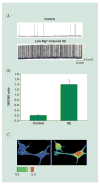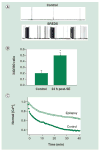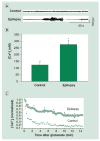Development of the calcium plateau following status epilepticus: role of calcium in epileptogenesis
- PMID: 19496685
- PMCID: PMC3476463
- DOI: 10.1586/ern.09.21
Development of the calcium plateau following status epilepticus: role of calcium in epileptogenesis
Abstract
Status epilepticus is a clinical emergency defined as continuous seizure activity or rapid, recurrent seizures without regaining consciousness and can lead to the development of acquired epilepsy, characterized by spontaneous, recurrent seizures. Understanding epileptogenesis--the transformation of healthy brain tissue into hyperexcitable neuronal networks--is an important challenge and the elucidation of molecular mechanisms can lend insight into new therapeutic targets to halt this progression. It has been demonstrated that intracellular calcium increases during status epilepticus and that these elevations are maintained past the duration of the injury (Ca(2+) plateau). As an important second messenger, Ca(2+) elevations can lead to changes in gene expression, neurotransmitter release and plasticity. Thus, characterization of the post-injury Ca(2+) plateau may be important in eventually understanding the pathophysiology of epileptogenesis and preventing the progression to chronic epilepsy after brain injury.
Conflict of interest statement
The authors have no other relevant affiliations or financial involvement with any organization or entity with a financial interest in or financial conflict with the subject matter or materials discussed in the manuscript apart from those disclosed.
No writing assistance was utilized in the production of this manuscript.
Figures





References
-
- Willmore LJ. Post-traumatic epilepsy: cellular mechanisms and implications for treatment. Epilepsia. 1990;31(Suppl. 3):S67–S73. - PubMed
-
- Cavalheiro EA, Leite JP, Bortolotto ZA, et al. Long-term effects of pilocarpine in rats: structural damage of the brain triggers kindling and spontaneous recurrent seizures. Epilepsia. 1991;32(6):778–782. - PubMed
-
- Lothman EW, Bertram EH., 3rd Epileptogenic effects of status epilepticus. Epilepsia. 1993;34(Suppl. 1):S59–S70. - PubMed
-
- Hesdorffer DC, Logroscino G, Cascino G, Annegers JF, Hauser WA. Risk of unprovoked seizure after acute symptomatic seizure: effect of status epilepticus. Ann Neurol. 1998;44(6):908–912. - PubMed
Website
-
- Internet Stroke Center at Washington Univ. in St. Louis. The Stroke Trials Registry. www.strokecenter.org/trials/InterventionDetail.aspx?tid=95.
Publication types
MeSH terms
Substances
Grants and funding
LinkOut - more resources
Full Text Sources
Research Materials
Miscellaneous
